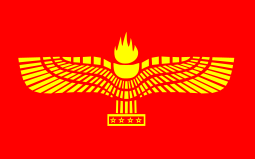Aramean Democratic Organization
Aramean Democratic Organization Party | |
|---|---|
| Leader |
Gabi Gallo (1988-2016) Roni Doumit Harb (2016-2017) |
| Founded | 1988 |
| Ideology |
Arameanism National conservatism Christian democracy Religious nationalism |
| Political position | Right-wing |
| Colours | Red, Blue and White |
| Website | |
|
www | |
Aramean Democratic Organization (Syriac: ܛܘܟܣܐ ܐܪܡܝܐ ܕܝܡܘܩܪܛܝܐ) (Arabic: التنظيم الآرامي الديمقراطي, translit. At-Tanzim al-Arami al-Dimoqraty) also known as ArDO, was founded in 1988[1] and is a Syriac Aramean political party in Lebanon.[2][3][4][5] The Aramean Democratic Organization's goal is to reestablish Aramean independence and reconstituting the Aramean Nation by reclaiming the heartland of the ancient ancestral homeland most of which lies within today's Syria and Lebanon.
Aim
To establish an independent democratic Aramean state on the land of Aram with Lebanon as a point of departure.
Objectives
- To build an opinion, on national as well as on international level, for the Aramean cause.
- To work for recapture the stolen geographical, historical and cultural rights of the Aramean people.
- Through political and mass media efforts, work for the foundation of an Aramean land in the historical homeland.
- To raise awareness regarding preservation of the Aramean linguistic, literary and cultural heritage from the systematic and governamental organized Arabization, Turkification, Kurdification, Iranization and Islamisation.
- To counteract the assimilation in the diaspora as well as in the homeland, and constantly work for the union of the Aramean people with the national cause, namely the future land of the Aramean, with the starting point from Lebanon.
- Gathering and return of the Aramean diaspora to the eventual independent state of "Aramea" established in the heartland of the Aramean Nation's historical homeland within present day central Syria.
- Reconstituting into Aramean nation, the various diasporic Aramean communities as well as dispersed Aramaic-speaking communities, who have been divided, renamed, misnamed and dispersed throughout the region by the ongoing processes of Arabization, Turkification, Kurdification, Iranization and Islamization. Most of these communities have suffered under constant Arab, Turkish, Kurdish and Persian occupation for centuries and many consider the cultural genocidal campaign of the occupation to be responsible for the varying names, which these communities are known by today.
Principles
- The Arameans as people possess a nation's all capacities such as a language, as well cultural and ethnic identity. But it is an oppressed people, whose original land (present-day central Syria) is occupied by the occupational forces of Syrian Arab Republic.
- Citizens of the Aramean nation are individuals belonging to the following communities:
- Syriac Orthodox Church /Mostly known as Aramean Orthodox Christians
- Syriac Catholic Church /Mostly known as Aramean Catholic Christians
- Melkite Greek Catholic Church's members mostly identify as ethnic Arameans
- Gabaadin's, Bakhaa's and Maalula's Christians /Mostly known as Aramean-speaking Christians
- Maronite Church /Some of them identify as Aramean Catholic Christians,
Flag
The Aramean flag will be the national flag of the future independent Aramea.

Language
The Aramaic language, the spoken language of Jesus Christ, would be the official language of the future Aramean nation state.
Religion
The Christian religion would be the only official religion of the future Aramean nation state within present-day central Syria.
Calendar
Most Arameans use a calendar in which the names of the months hearken back to the Ancient Aramean calendar.
See also
References
- ↑ A R A M E I S K K R O N O L O G I Archived 2010-08-12 at the Wayback Machine.
- ↑ "Lebanon Political Parties". Retrieved 9 April 2017.
- ↑ Arab Decision Archived February 10, 2006, at the Wayback Machine.
- ↑ "International - Unrepresented Nations & Peoples Organisation". Retrieved 9 April 2017.
- ↑ "Arab Decision". Retrieved 9 April 2017.
External links
- Aramaic Democratic Organization - Official party site
